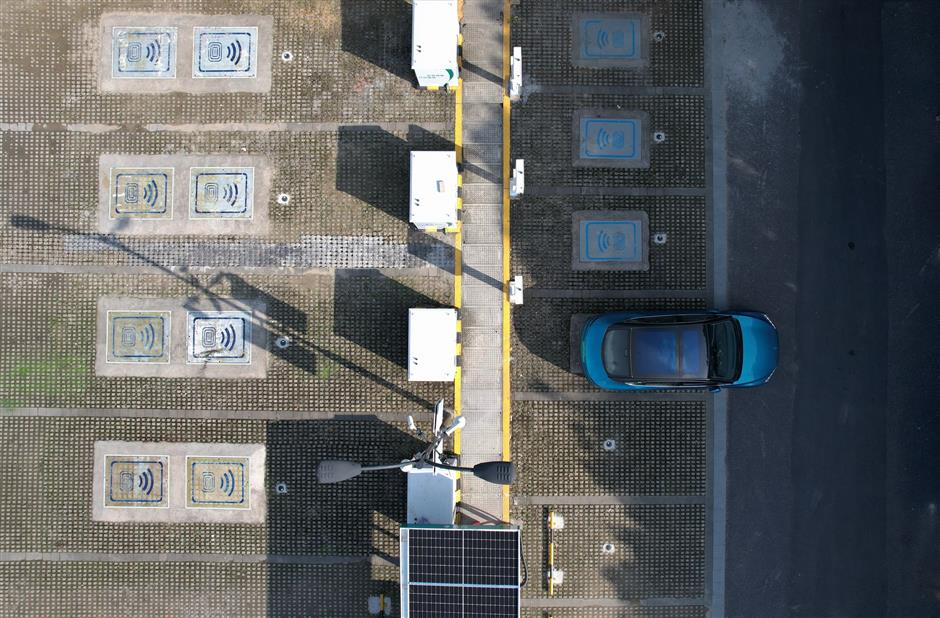Electric cars get cheaper, charging them gets more expensive

A worker paints the stands at a new electric-vehicle charging station in the city of Jinan in Shandong Province.
The cost of recharging an electric vehicle is rising across cities like Shanghai, leading to concerns about the profitability of a sector that is vital to China's aims of becoming a world leader in clean-energy cars.
The cost increase coincides with China's peak summer season of electricity demand and comes after large charging stations were reclassified as "industrial" users, subject to higher electricity rates than retail users.
That has put a burden on people who rely on electric cars for their livelihood, like a Shanghai ride-hailing driver surnamed Yao.
"The cost per kilowatt-hour has increased to 1.8 yuan (24 US cents), and now it costs me about 0.50 yuan more per kilowatt-hour," Yao said.
China is the world's largest market for clean-energy vehicles. Government incentives for buyers and the industry, combined with lower prices amid a competitive market of EV carmakers, have resulted in electric vehicle sales outstripping the availability of charging stations.
The noble aim of carbon neutrality is now butting up against cost realities.
Shanghai driver, Zhang Cheng, said he is paying about 2.13 yuan per kilowatt-hour, including service fees, when charging his electric vehicle at work.
One lunchtime charging station in downtown Jing'an District was charging 2.2 yuan per kilowatt-hour, an 80 percent increase from the past, Zhang said.
A Shanghai cab driver surnamed Han, who works for Haibo Taxi, told Shanghai Daily that his monthly charging expenses have surged more than 500 yuan a month.
The increase has been especially noticeable this summer when he needs to keep his vehicle air conditioned.
Han said he sometimes drives to outlying charging stations at night, where electricity fees are lower during off-peak hours.
The problem facing EV owners is not confined to Shanghai. Other Chinese cities, including Wuhan, Qingdao, Chongqing and Guangzhou, have all experienced rising costs for charging.

A new energy vehicle equipped with wireless charging capability is recharged at a facility at the Hangzhou Asian Games village.
In May, the National Development and Reform Commission unveiled a revised electricity-pricing structure that reclassifies large electric-vehicle charging stations as "industrial users," causing an increase in rates.
Tong Zongqi, deputy secretary-general of the China Electric Vehicle Charging Infrastructure Promotion Alliance, said the new policy and peak summer electricity demand have contributed to the rise in charging costs, forcing charging stations to raise prices.
Costs matter as more EVs hit the road. In the first half of this year, sales of new energy vehicles in China rose 44 percent from a year earlier to 3.7 million units. Electric vehicles now comprise 28 percent of the auto market.
By the end of 2025, the number of electric vehicles is expected to exceed 40 million units on the mainland.
There are over 345,000 companies operating charging stations in China. Last year, more than 100,000 were newly registered – a 47 percent increase from a year earlier.
However, many enterprises that thought they were going to cash in on a lucrative market have reported financial losses.
TELD, a leading electric vehicle charging station provider, has suffered three consecutive years of losses, with the largest exceeding 50 million yuan.
Star Charge, another prominent provider, said it believes it is the only company in the industry to be showing any profitability.
The infrastructure alliance estimates there are more than 6.6 million charging poles nationwide, resulting in a ratio of 2.6 electric vehicles per charging pole.
However, the average utilization rate at public charging stations remains between 3-5 percent. To achieve the break-even point, the utilization rate needs to be around 8 percent, suggesting that charging infrastructure has yet to cross the threshold of profitability.

Shanghai's first road-based EV charging station begins operation on Liyuan Road in Huangpu District.
"As China pushes toward widespread electrification, charging infrastructure remains a critical aspect of the EV ecosystem," Tong told The Beijing News.
The challenges of pricing fluctuations, imbalance between supply and demand, and industry profitability underscore the need for a comprehensive approach, he added.
He suggests standardizing price mechanisms, similar to those applied to traditional fuels, to promote fairness, transparency and stability in the charging market.
Government initiatives to boost EVs, like the recent "Measures for Restoring and Expanding Consumption" document released by the commission, emphasize the importance of developing better charging infrastructure.
Among its recommendations, the document calls for a "scientific layout" of charging infrastructure and the promotion and application of battery-swap technology, which allows EV batteries to be quickly replaced with fully charged batteries at dedicated stations.
Recognizing the potential repercussions of unchecked price fluctuations at charging stations, some regulatory authorities have taken action.
The market watchdog in the city of Zhengzhou in Henan Province issued a warning letter to charging-station operators, urging them to adhere to stipulated pricing.
The development and reform commission in Shandong Province introduced a new system of price tiers based on times of usage during the day.

An electric bus charging station in Shanghai's Huangpu District.















